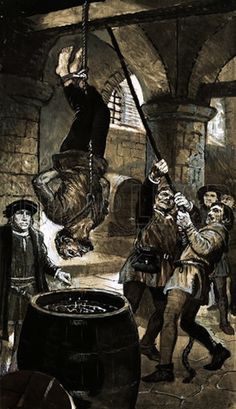Another story of a cruel and unreasonable ruler: The Chief and the Carpenter (“Animated Tales of the World,” 2002), from the Caribbean. This one has a touch of the Tower of Babel to it.
Tag Archives | Middelboe
Middelboe Chronicles, Part 29: Richard III
If yesterday’s Shepherd Boy Tumur illustrated Plato’s dictum that the best ruler is one who doesn’t want the job, today’s Richard III (“Shakespeare: The Animated Tales,” 1994) illustrates the corollary: that the worst ruler is one who wants the job very, very badly.
It’s a bit surprising that we don’t get to see Clarence’s famous butt:

GLOUCESTER: Simple, plain Clarence! I do love thee so,
That I will shortly send thy soul to heaven ….
But, soft! here come my executioners. …FIRST MURDERER: Take him over the costard with the hilts of thy sword, and then we will chop him in the malmsey-butt in the next room. …
CLARENCE: Where art thou, keeper? give me a cup of wine.
SECOND MURDERER: You shall have wine enough, my lord, anon. …
FIRST MURDERER: I’ll drown you in the malmsey-butt within. …
DUCHESS OF YORK: Was never mother had so dear a loss! …
These babes for Clarence weep and so do I …GLOUCESTER: That is the butt-end of a mother’s blessing.
I can’t resist appending a clip of my favourite version of Richard III – Ian McKellen, of course:
Middelboe Chronicles, Part 28: Shepherd Boy Tumur
As with yesterday’s The Multi-Coloured Jackal, so with today’s Shepherd Boy Tumur (“Animated Tales of the World,” 2002) from Mongolia, a naïf is made a ruler and his idle prattle is interpreted as deep wisdom:
Middelboe Chronicles, Part 27: The Multi-Coloured Jackal
“A king who doesn’t demand to eat us!”
An outsider with a coat of many colours arrives in an established kingdom and rises to a position of authority. No, I’m not talking about yesterday’s story of Joseph; I’m talking about The Multi-Coloured Jackal (“Animated Tales of the World,” 2004), a story from India:
Middelboe Chronicles, Part 26: Joseph
From one Biblical captive and interpreter of kings’ dreams to another, we pass from Daniel to Joseph (“Testament: The Bible in Animation,” 1996):
From a libertarian economic standpoint, there’s something a bit dodgy about Joseph’s story: “A famine is coming, Sire! We must institute central economic planning!” [seven years later] “Oh look, we have a famine.”
Joseph’s story is also a version of the Oedipus / Samarra paradox: what the brothers do to prevent the prophecy from coming true is exactly what leads to the fulfillment of the prophecy.
And while we’re on the subject of Joseph, it turns out that the entire film of the Andrew Lloyd Webber musical version, with nearly every song in a different musical genre (and with Dutch subtitles, because je kunt nooit teveel Nederlands hebben, heb ik gelijk?) is online:
I’m particularly fond of the performances of Jeff Blumenkrantz and Maria Friedman in this.
And as a bonus, here’s a clip of Ben Kingsley as Potiphar in yet another version of Joseph:
The downside of casting Ben Kingsley as Potiphar is that you don’t really remember any of the other characters. But the positive side is – Ben Kingsley!
Middelboe Chronicles, Part 25: Daniel
More enchanted lions – this time, enchanted on behalf of the Biblical prophet Daniel (“Testament: The Bible in Animation,” 1996). This one has an interesting modern-day framing device that poses questions about the desirability and limits of Jewish assimilation into Gentile society:
This animated version also ends with Daniel pleading for clemency toward those who had accused him, and for “mercy and forgiveness for all, and deliverance for all people everywhere” – though whether this plea is granted or refused goes unmentioned. By contrast, in the original Biblical story, “the king commanded, and they brought those men which had accused Daniel, and they cast them into the den of lions, them, their children, and their wives; and the lions had the mastery of them, and brake all their bones in pieces” – and Daniel raises not a peep of protest.
Incidentally, while I’ve been calling this Russian-Welsh series of animated versions of classic stories the “Middelboe Chronicles,” from the involvement of Penélope Middelboe as one of the main people behind the series, I notice that her name is often paired with that of Martin Lamb, to an extent that suggests that these should really be called the “Lamb-Middelboe Chronicles.”
However, it’s too late to change it now; for the law of the Medes and Persians is, That no decree nor statute which the king establisheth may be changed.